#dramatic soprano.
Explore tagged Tumblr posts
Text

Mme. Marcella Sembrich, whose successes as a star of the opera were followed by widely hailed achievements as the mentor of singers after her retirement in 1909 from the Metropolitan and from the concert stage in 1916, died at 8 A. M. yesterday in her home, 151 Central Park West. She was 76 years old. She had been ill since last Nov. 15, with her condition becoming progressively worse as she lost strength. For the last few days death, which was attributed to emphysema and heart complications, had been hourly imminent. So widely was she known, however, not only in New York City but also in other cities of the United States and abroad, that the foreknowledge of the end did not dim the shock of her passing. Persons who called at or telephoned to her home yesterday forenoon for| news of her condition were in-'| formed of her death, and then to)! the apartment began a steady succession of messages of condolence and of callers to express their grief.
Son Present at the End. Recently, Mme. Sembrich had been in such a weak condition that she had received no callers. With her at the time of her death were her son, William Marcel Stengel, and her daughter-in-law, Mrs. Juliette Stengel. Her husband, Wilhelm Stengel, died in 1917. She had no other close relatives in the) United States. Until the onset of her illness she had remained actively at work as a. teacher. During the Summer she) had conducted the school she had maintained for a number of seasons at Lake George, N. Y. Many satudents got instruction there from her | rich store of operatic accomplishment.
New York in October and took up her residence in her apartment,which overlooked , Central Park. She went forward as usual with her teaching. Since her illness, however, which at first took the form of asthma and interfered seriously | with her breathing, all of her contact with her students had been curtailed. To conserve her strength, the utmost quiet was prescribed by her physician, Dr. Charles Goodman Taylor. Friends said yesterday, however, that her advanced ace had from the first made her, illnes a matter of serious concern to them. : Her teaching contacts previously had been linked both with the Juilliard School of Music here, and) with the Curtis School in Philadelphia. She was a director of the, latter institution until last year, and was the recipient of a degree of Doctor of Music for her work there. In accordance with what was understood to be a wish of Mme. Sembrich, and of her family, the funeral services will be simple. The services, it was announced, will be held at 3 P. M. tomorrow in St.Patrick’s Cathedral. There will be. no special music, other than that, by the boys’ choir of the cathedral. The place of burial was not made known.
Active pallbearers were announced as Cornelius N. Bliss, Serge Rachmaninoff, Josef Hofmann, Ernest Hutcheson, Ernest Schelling, Frank Ia Forge, Wilfred Pelletier, André de Coppet, Walter Damrosch, Antonio Scotti, H. H. Flagler, W. J. Henderson, Richard Aldrich, Emilio de Gogorza, Edward Ziegler, Adolfo) Betti, Efrem Zimbalist and Paul D. Cravath. | Honorary pallbearers will be Giulio Gatti-Casazza, John Erskine, Francis Rogers, Alexander Siloti, Ugo Ara, Dr. W. H. Haskin, Adolph S. Ochs, Alfred Pochon, Rubin Goldmark, Sigismund Stojowski and Dr. J. A. Taylor.
When Marcella Sembrich sang her |farewell to opera on Feb. 6, 1909,her voice was young and beautiful. The final rise of the curtain that | night revealed her enthroned on | the Metropolitan Opera House) stage. Grouped about her was every member of the Metropolitan Opera Company. Facing her was an audience that filled every foot of floor space from the doors to the roof. Gifts were piled high beside her throne and great masses of flowers | stretched into shadows far down. the stage. “It is because I like the sun best | when it is high,’’ she said, in ex- | planation of her retirement. ‘‘It is | better that I leave when every one is asking ‘why?’ than later when. my ability might be less.’’ * She was then within nine days) of being 51 years old. She had | reigned at the Metropolitan for| more than a generation; she had/| typified for three decades here and| abroad the highest perfection of| bel canto singing. Just as Mme. Adelina Patti had done before her, she had kept alive the old traditions of Italian song, and with Melba she had carried on to increasingly greater heights the traditions of the old Italian mastery of the voice. She had found success early and it had lasted long. In her bright career was no place for anticlimax. She never could recall a time when music was not the chief interest of her life. There were piano lessons when she was 4 years old; lessons on the violin two years later. After she had developed a remarkable ability on both instruments recognition of her extraordinarily appealing and expressive colorature soprano voice came when she was 15. So she had, as Franz Liszt told her, ‘‘three pairs of wings to fly with through the land of music.”” ‘‘But sing,” he had ordered, ‘‘sing for the world, for you have the voice of an angel.’’ Music, poverty and endless work made up her childhood. She was born Praxede Marcelline Kochanska on Feb. 15, 1858, in the hamlet of Wizniewczyk, Galicia, Poland. Her father, Kasimir Kochanski, one of fourteen children of a tanner, had run off and joined a military band. Leaving to marry, he had learned to play all the musical instruments and was able to make a passable living by his skill.
The family made up a home quartet. Her mother, whose maiden name was Sembrich, played second violin, her brother first violin, the father a ‘cello and Marcelline the piano. They wandered about seeking pupils. As the daughter grew older she played piano to her father’s violin in the homes of the minor nobility and rich townsfolk, Always very poor, they had to borrow the scores of Haydn and Mozart, and the daughter worked by candlelight, copying the parts. She was 12, alert and confident, a self-supporting artist—she lived very cheap—when she met her first patron. A wandering singer of folk-songs, Father Lanovich, liked her instrumental accomplishments so much he helped her to enter the conservatory at Lemberg. In three years one Wilhelm Stengel, instructor of piano, taught her all he had to teach. He took her to Liszt and the great man talked of her wings. He gained her a hearing wit: Epstein, who accepted her as a student of piano and to Helmesberger, under whom she studied the violin. He took her to Rochitansky, in Vienna, under whom she _ studied voice. Then, when she was 19 years old and ready for her début he married That year of her début and marriage, 1877, she wintered in Milan, learning from the younger Lamperti that Italian ‘‘bel canto’’ which she was later to make her special art. To Milan then as now came impresarios seeking singers. Marcelline had two offers. One would have taken her to Tiflis, across the Black Sea. The other called to Athens and she accepted it. The night of her début was June 3, 1877. It was very hot; the opera was at Phaleron by the sea. The King entered the royal box and the opera, “‘I Puritani,’’ started. The new singer was well received, but ee was no great sensation about it.
In the next year advisers on her musical career worked. over her name and molded it into Marcella Sembrich. She appeared as Sembrich at the Saxon Royal Opera at Dresden and had an immediate and tremendous success. A two-year engagement in Dresden followed.
Then she made her London début at Covent Garden in 1880. It was in ‘Lucia’? and the critics reported that London was dazzled by her vocalization. A season of grand opera in Madrid followed directly and then the first of fifteen seasons in St. Petersburg and Moscow. Those were great days for the opera. The gracious applause of royalty was important and thrilling then. The young singer had much of it. Orders and decorations and royal gifts began overwhelming her. But in 1883 she left Europe for New York.
She came in stirring times. A war was on between the old and the rew. Insurgents from the old citathe Academy of Music, had joined with considerable recent wealth to build the Metropolitan Opera House, familiarly known As the ‘‘White Elephant,’’ where every one with enough money could sit in a box and show off gowns and jewels. Adelina Patti was retained by the old; Christine Nilsson by the new. | Marcella Sembrich, then only 25) years old, rated next to Nilsson in| in “‘Lucia,’’ the second opera it, gave, and sang Patti’s roles. By the end of the season the critics could find no praise too She was not, of coursé, favored above Patti. When Patti Sang the Academy was two-thirds For Patti was was Queen of But Marcella Sembrich did make a real place for herself. Her great night of that first year was April 21, 1884. Henry E. Abbey, impresario for the Metropolitan, had found hard going that first year. He had gambled on exrensive productions and lost heav‘- .. A benefit was given for him. The littl. girl whose father could play all the instruments in the band showed off her three pairs of wings. She sang an aria from ‘“‘La Sonnambula,’” she played a nocturne by Chopin and furnished the violin obbligato to Gounod’s ‘‘Ave Maria,’’- sung bv Miss Nilsson. One critic the next day described her as a “‘meteor in a galaxy of More Singing Lessons, England and many long tours of the Continent followed. She appeared in opera and concerts in St. Petersburg, Moscow, Warsaw, Berlin, Paris, Madrid and lesser capitals, sharing the first honors of Italian opera with the most distinguished artists of her generation and with the great ones who had been famous when she was still playing for dances in Galicia. In 1897 she came back to America for a concert tour, and in ovember, 1898, rejoined the Metropolitan Opera Company. In the Metropolitan’s répertoire she made the operas of the florid Italian school inevitable. In the succeeding seasons she lost none of her vocal powers. Several stars of the last generation made their debuts by her side. She reappeared as Gilda on Nov. 23, 1903, for Caruso’s American début as the Duke in ‘‘Rigoletto’’ and she sang with him in his first successes. There were several reasons why she retired in 1909, when her career was at zenith, when she was winning the operatic honors and popularity that were to be equaled only by Caruso. One was that fashions in opera had changed. In her younger days, as she put it, you just came out In your nicest evening frock and sang. But by 1909 the dramatic opera had pretty much taken the place of lyric opera and she found that while the public had once wanted to hear only the old operas sung over and over again, they then wanted ‘‘a new role every week.’’
For some years. after retirement from opera she continued in concert tours both here and abroad. ‘“‘Gradually,’’ she had said in re-calling the period, “I began to feel the desire of transmitting to the younger generation of today the art that I had learned so thoroughly. and practiced so long.’’ After the death of her husband in 1917 she withdrew entirely from the public platform and devoted her time and energy exclusively to teaching. Aspirants came to her and she selected and labored over the most promising. Stars of the Metropolitan and other companies came also; ‘‘for inspiration,’’ they always said, but Sembrich’s aides ‘the ichestra, she appealed to the public knew they were seeking perfection. When the Juilliard Foundation was established in New York and the Curtis Institute of Music in Philadelphia she was called to head the departments of voice. In the succeeding years at New York, Philadelphia and at her estate in Lake George pupils from all over the world assembled for her tutelage. She gave many stars to the musical | firmament. Her most. successful pupils included Dusolina Giannini, Queena Mario, Alma Gluck, Hulda Lashanska, Harriet van Emden, Ethyl Hayden, Florence Page Kimball and many others. Her great hope in the last few years of her life was that America should have a national opera— opera through a movement that should reach out to every part of the country, bringing to the nation the culture that goes hand in hand with musical development. It would utilize American talent and its productions would be entirely in English. It was on behalf of this movement that she appealed to the public béginning in 1930 when the depression threatened the American opera. First her efforts were in behalf of the American Opera Company. Then she returned to the stage of the Metropolitan on Feb. 26, 1933, at the jubilee stage show, and begged her old friends to help the Metropolitan, urging the company and its followers to ‘‘carry on.”’
For the Metropolitan, as well as Philharmonic-Symphony Oragain on her seventy-sixth birthday on Feb. 15, 1934. Paderewski, her friend of many years’ standing, sent her the following message on this birthday: ‘‘Most affectionate. wishes and greetings to the greatest and noblest artist and friend, from Paderewski."’ Except for such occasions, and in addition her chairmanship of the Polish-American Relief Fund during the war, she remained in retirement from the public eye. But in the world of music, even to her last days, retirement was not for her. She occupied a position in American music such as Liszt had in the Weimar days. Musical notables came to her studio, her ‘“‘trophy room,” as she called it. Surrounded by mementos of Brahms, Verdi, Rubinstein, Gounod, Thomas, Paderewski, Modjeska, Joachim and Clara Schumann and others of the great artists who had worshiped her talent, she was sought for the gospel of perfection with which she inspired fellow-musicians. In those last years most of her time was spent in America, her Winters in the apartment facing Central Park, replete with cherished reminders of her lifelong triumphs; her Summers at Lake George at the estate she had established with her husband and teacher, and-to which they used to repair in the early days of her retirement. She was one of the really great personalities in the music world, one of the great ones whose sun was always high.
#classical music#opera#music history#bel canto#composer#classical composer#aria#classical studies#maestro#chest voice#Marcella Sembrich-Kochańska#Marcella Sembrich#Marcelina Sembrich-Kochańska#Covent Garden#Royal Opera House#Metropolitan Opera#Met#dramatic coloratura soprano.#dramatic soprano.#coloratura#the Polish Nightingale#the Nightingale#the Polish Patti#Polish Patti#classical musician#classical musicians#classical history#history of music#historian of music#musician
4 notes
·
View notes
Text

Italian operatic dramatic soprano Lina Cavalieri on a vintage postcard
#postal#operatic#lina cavalieri#historic#ansichtskarte#sepia#vintage#tarjeta#lina#italian#briefkaart#dramatic#photo#postkaart#ephemera#postcard#postkarte#soprano#photography#carte postale#cavalieri
23 notes
·
View notes
Text
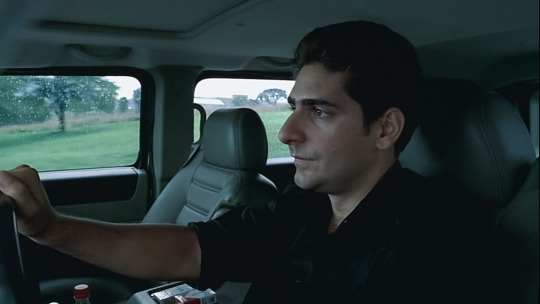
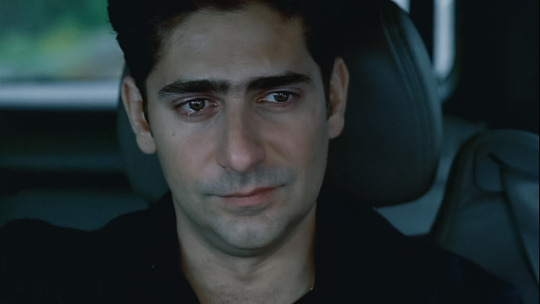
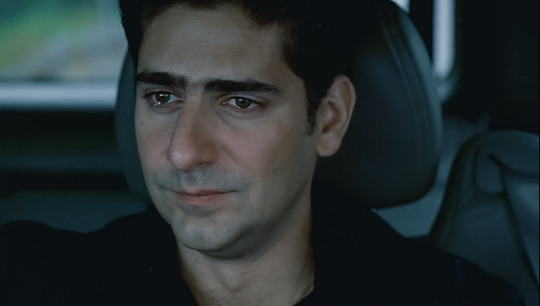
The Sopranos - David Chase
#the sopranos#sopranos#christopher moltisanti#michael imperioli#y2k aesthetic#y2k movies#y2k#alcoholism#drama#crime#romance#mafia#dramatic#depresion#sadnees#sad#cry#chris moltisanti
30 notes
·
View notes
Text
Massive bel canto dramatic soprano voice forced to sing angelic light coloratura. Here's what she should be singing instead.
#la carlotta#phantom of the opera#carlotta giudicelli#poto#gaston leroux#opera#bel canto#dramatic soprano#soprano#character playlists#Spotify
5 notes
·
View notes
Text
Remembering the greatest of the tenors and Joan's close friend - Luciano Pavarotti (12 October 1935 - 6 September 2007).
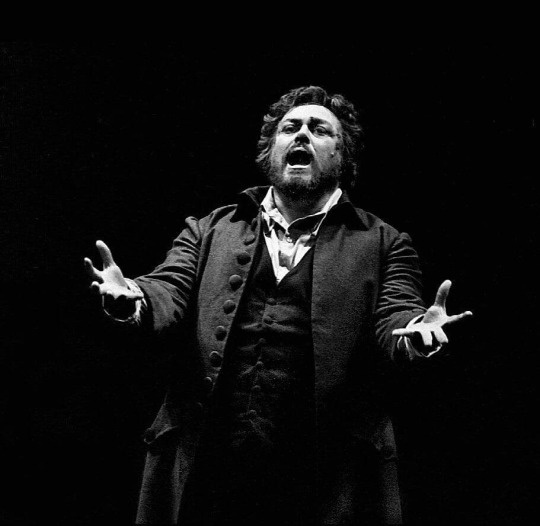
[…] "Going to Australia with Joan, first of all, I've learned to be a very serious professional singer and from her particularly, I learn to breath, who is the most important thing, but the most difficult. More than anything, I think the technique is perfect, I think it's probably the most incredible technique of all the time I would say." […]
Excerpt taken from the documentary "Pavarotti - 2019" by Ron Howard.
#classicalmusic#opera#operasinger#operahouse#baroque#belcanto#tenor#LucianoPavarotti#Pavarotti#dramatic#coloratura#soprano#joansutherland#lastupenda#diva#primadonna#1960s#1970s#documentary#ronhoward
14 notes
·
View notes
Text
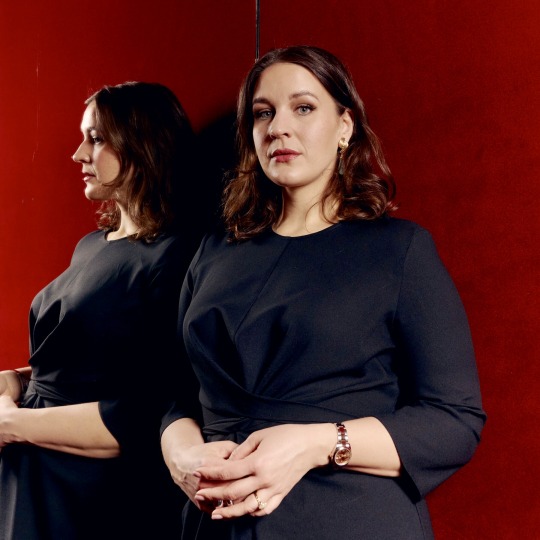
Lise Davidsen (born 8 February 1987, Stokke Norway) is an opera singer, lyric dramatic soprano.
#lize davidsen#opera singer#soprano#lyric dramatic soprano#the metropolitan opera#la forza del destino#leonora
2 notes
·
View notes
Text
youtube
13 years today... rip queen. who could ever do it like you.
#(tetrazzini could and did and kinda did it better cause she had chest too but shshshhsh thats not important rn. she was TETRAZZINI. come on)#i dont talk enough about how much i love sutherland on here. prolly because she's pRoBLeMatIc but like. fucking listen to that.#she was INCREDIBLE in the early 1960s#i dont care about anything else. jesus h christ what a voice.#like yes she would have been a great dramatic soprano with this instrument if she had kept her technique Right.#but truth be told i dont care. her coloratura singing was absolutely sublime. even with the wabbababababba diction whatever#joan sutherland you will always be famous#i used to be obsessed with her BEFORE i was ever obsessed with tebaldi or even bastianini#she was the first of the Old Singers (though she's not really one of the Properly Old ones but shh) that i started listening to#what a legend#joan sutherland#opera tag
4 notes
·
View notes
Text
I swear in every Polish church there is that one (1), usually elderly, lady who believes she is Maria Callas and this is a concert instead of a mass
2 notes
·
View notes
Text
watching the sopranos rn (first time eva) and im 3 episodes into s4 which my dad told me is where it starts to really pick up. hey its a different show, like this is a different programme altogether
#everything is entirely different#it was 3 ep to season long arcs before. occasionally peppered with ep long issues#but typically most scenes contributed to long themes. there was no A B plot structure (A plot is the plot of the episode. B plot is the over#all plot of a season)#and everything remained within the mafia. and fairly self-contained#suddenly we've got heavily self-contained episodes with a huge focus on the A plot with little to no carry-over into the next#like it was a story about the terror of growing up to become a mafia leader. then the SA episode. then i dont remember what the last one was#and there are longer arcs bubbling in the background#crazy. its much more exciting and satisfying#interestingly one of the main writers for the sopranos went on to make madmen which ive already seen#and they also had a major upheaval of the exact same type in season 4. where the stakes were suddenly and dramatically upped#i didnt like it in madmen because i enjoyed its vintage feel#but i got used to it eventually#also im really impressed with how they write tony soprano. i go through wildly hating him to loving him within a single ep#which makes me wonder what the fuck went wrong with don draper. i hated that man from start to end#how do u write mr soprano and then fuck up draper that bad#oh well#if anyone actually read all this do u want to go out for a date#or if uve seen either of these pls tell me ur thoughts
3 notes
·
View notes
Text
i would've done the fach system so much better actually (<- has never seriously studied classical/operatic voice)
#introducing a vocal type in between mezzo and contralto#<- my only evidence is that the contralto break is at D and the soprano break is at F and then mezzos have breaks at E or Eb. that's 4#and my brain is used to the 8 prt choral satb system and the alto 2s (most of whom are mezzos and not contraltos) are Not the same as sop 2#(and like 'light lyric mezzo' vs 'dramatic mezzo' no shut the fuck up. there should just be another classification)#also the lower voice types get 3 low ones and then an androgynous one and if a contralto is already characterized by an androgynous tone#then there should be 3 other ones too for symmetry#i am just mostly making shit up though#the fach system seems to work well for opera! and i don't understand it enough to seriously critique it. but most people don't sing opera#but since ppl (esp western ppl) always want to know their category even when it doesn't matter or is actively unhelpful#*i* think we should come up with a better contemporary system#sorry for the essay in these tags poor nia has had enough in her dms#kade speaks
3 notes
·
View notes
Photo
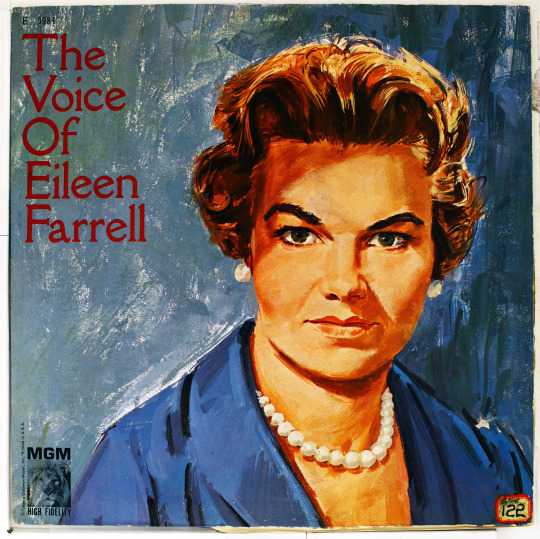
The Voice of Eileen Farrell
4 notes
·
View notes
Text
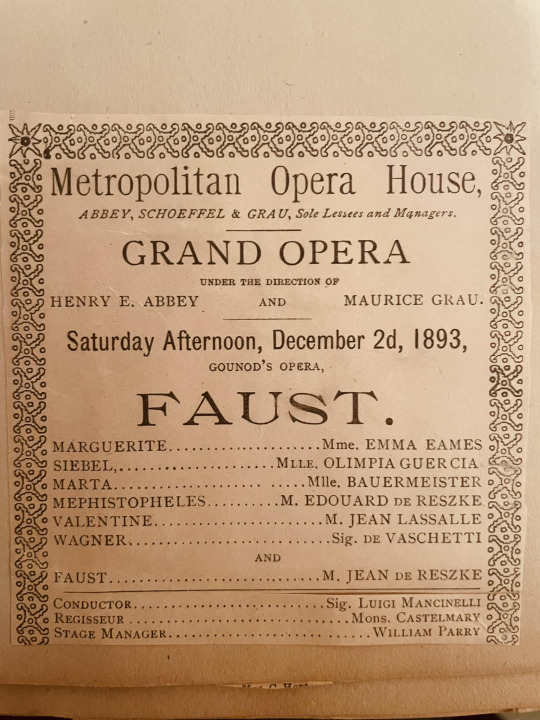
A performance of Gounod Opera „Faust“ at The Metropolitan Opera 1893.
#classical music#opera#music history#bel canto#composer#classical composer#aria#classical studies#maestro#chest voice#Charles Gounod#Faust#Metropolitan Opera#Met#Emma Eames#dramatic soprano#lyric soprano#soprano#Édouard de Reszke#bass#Jean-Louis Lassalle#baritone#Jean de Reszke#dramatic tenor#tenor#classiacal musician#classical musicians#classical history#history of music#historian of music
31 notes
·
View notes
Text

Italian operatic dramatic soprano and actress Natalina "Lina" Cavalieri on a vintage Reutlinger postcard
#lina#postal#operatic#reutlinger#historic#ansichtskarte#natalina#sepia#vintage#tarjeta#italian#briefkaart#dramatic#photo#natalina cavalieri#postkaart#ephemera#postcard#actress#postkarte#soprano#photography#carte postale#cavalieri
18 notes
·
View notes
Text
I'm definitely going to start working on this one, along with "Who Knew" by P!nk. Starting today. I had other projects but these two songs fit my mood much better than the other rock/metal songs I had in mind.
Louder, louder The voices in my head Whispers taunting All the things you said Faster the days go by and I'm still Stuck in this moment of wanting you here Time In the blink of an eye You held my hand, you held me tight Now you're gone And I'm still crying Shocked, broken I'm dying inside Where are you? I need you Don't leave me here on my own Speak to me Be near me I can't survive unless I know you're with me Shadows linger Only to my eye I see you, I feel you Don't leave my side It's not fair Just when I found my world They took you, they broke you, they tore out your heart I miss you, you hurt me You left with a smile Mistaken, your sadness Was hiding inside Now all that's left Are the pieces to find The mystery you kept The soul behind a guise Where are you I need you Don't leave me here on my own Speak to me Be near me I can't survive unless I know you're with me Why did you go? All these questions run through my mind I wish I couldn't feel at all Let me be numb I'm starting to fall Where are you? I need you Don't leave me here on my own Speak to me Be near me I can't survive unless I know you're with me Where are you? Where are you? You were smiling... You were smiling... You were smiling...
Kelly Clarkson, Haunted (My December, 2007)
#music#personal#favs#self-taught singer#non-professional singer#mezzosoprano#mezzo-soprano#contralto#alto#(...still not sure. I decided I'm either a light contralto or a dramatic mezzo.)#text
0 notes
Text
My soprano OC is cooler than yours. Her voice sounds like Rosa Ponselle, Luisa Tetrazzini, Virginia Zeani, and Eileen Farrell all put in a blender. She looks like model Tara Lynn. She has a developed chest voice, unlike your constricted soprano. She doesn't neglect her head voice, either.


She's a bisexual fencer. Her name is Julie D'Aubigny Dulie J'Aubigny.
#i don't know anything about anything i said re sopranos but i know those things sound natural and effortles when done right#oc#opera#dramatic coloratura soprano#Spotify
1 note
·
View note
Text
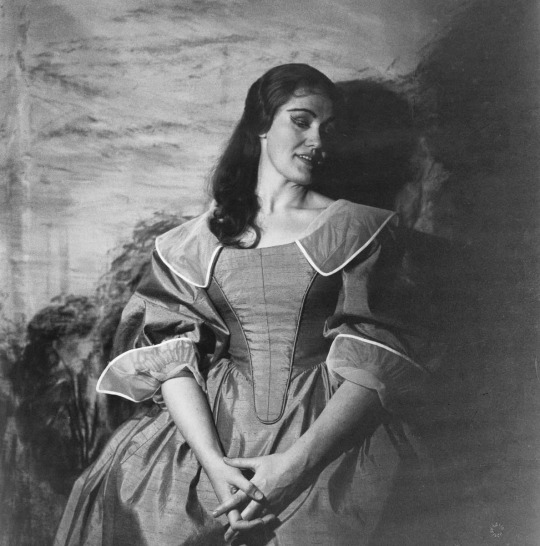
“When one is singing high and loud it’s as though one is in light air, high upon a mountain. I feel a lightness and dizziness. Exhilaration too. I’ve never smoked marijuana, but I fancy it might be the same sort of feeling.”
Joan Sutherland
Portrait as Lucia di Lammermoor. Feb 1959.
#quotes#portrait#gaetanodonizetti#luciadilammermoor#operasinger#opera#operalover#operahouse#roh#1950s#belcanto#baroque#dramatic#coloratura#soprano#joansutherland#lastupenda#diva#primadonna#classicalmusic
13 notes
·
View notes